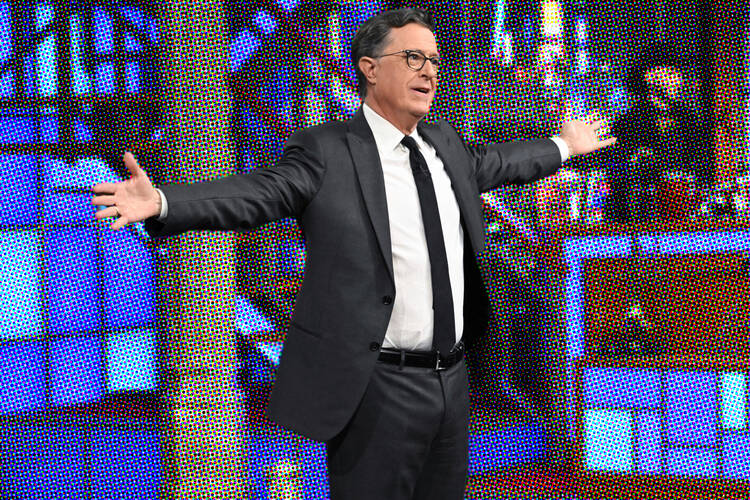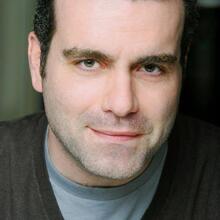As they say, two things can be true at once. And so it is that I felt two things when Stephen Colbert announced last Thursday that in nine months, CBS would be ending his top-rated “The Late Show with Stephen Colbert.” I felt uncomfortable. And I felt old.
Colbert’s announcement shook the American media landscape and raised questions not only about the legitimacy of CBS’s reasoning for discontinuing the show but also about the future of late-night television at large.
Here is why I feel uncomfortable, and maybe you do, too, dear reader. Americans can agree we live in “interesting times.” Many are speculating that “The Late Show” is an indirect victim of these times as they manifest in the realm of President Donald J. Trump’s administration. Just two nights before Colbert made his announcement about the impending demise of “The Late Show,” he referred to Paramount’s $16 million settlement with the president in a lawsuit Mr. Trump had filed against the company. The lawsuit centered on the editing of a “60 Minutes” interview with former vice president and presidential candidate Kamala Harris. Colbert called the settlement of the lawsuit “baseless” and a “big fat bribe.”
Paramount is CBS’s parent company.
The alleged bribe that Paramount gave would presumably be used as a means to curry favor with the president, a favorite target of Colbert, in anticipation of a proposed acquisition of Paramount Global by Skydance Media. Skydance’s chief executive, David Ellison, is the son of tech billionaire Larry Ellison, a major backer of Mr. Trump.
Besides the outcry across social media over Colbert’s departure, politicians such as Democratic Senators Elizabeth Warren and Bernie Sanders have questioned CBS’s and Paramount’s motives. The Writers Guild of America has called for New York State Attorney General Letitia James to launch an investigation into “potential wrongdoing” by Paramount.
CBS maintains that the decision was “purely a financial [one] against a challenging backdrop in late night” and that it had nothing to do with the host or content of “The Late Show.” But the reality is that the timing of the whole situation, especially in light of Colbert’s calling out of Paramount and the lawsuit, as well as the president’s comments that he “absolutely loved” Colbert’s dismissal (while offering warning shots to Jimmy Kimmel and Jimmy Fallon), makes these times more “interesting.” And to be clear, when I say “interesting,” I mean scary.
But there is also the “I feel old” part, as there is something to be said for CBS’s claim that cancelling Colbert was a financial decision. According to sources, “The Late Show” is running an annual shortfall of $40 million.Though Colbert’s show is the highest-rated late-night show according to the traditional Nielsen ratings, on social media platforms (TikTok, Instagram and YouTube), which track a younger, more desirable audience, “The Tonight Show Starring Jimmy Fallon” and “Jimmy Kimmel Live!” prove to be more popular than “The Late Show.” It has also been reported that while brands have spent an estimated $32.2 million on advertising for Colbert’s show, spending on both Fallon’s and Kimmel’s has topped $50 million each.
Regardless of Colbert’s success, late-night television as we know it—and by we, I mean those of us that can conjure up at least the faintest memories of Johnny at the desk and Ed McMahon on the couch—is dying. In the past seven years, late-night television ad revenue across the board has dropped 50 percent.
Late night, sooner than later, is set to go the way of the daytime soap opera—remember those? The dwindling is sad for me, as someone who spent his Gen-X adolescence watching “Late Night with David Letterman” on the miniature black-and-white TV I had in my bedroom. One of my first reactions to Colbert’s cancellation was that having so many late-night hosts—Fallon, Kimmel, Colbert, Seth Meyers, et al.—was a new phenomenon. In my mind, it used to be only Johnny Carson, followed by Letterman. Then I realized it has been more than 30 years since Dave started the “Late Show” franchise on CBS to compete with Jay Leno, who had replaced Johnny at “The Tonight Show.” Thirty years. So yes, I am old.
We have long passed the time when the media was a unifier; if we didn’t all love Walter Cronkite on the evening news, we all loved Lucy in primetime and Johnny in late night. The media, specifically television in the second half of the 20th century, brought people together in the shared experience of spectatorship because of its limited options. We did not all watch Johnny Carson together, but we could talk about his monologue the next day at the office or in the classroom.
The inevitable advancement in technology created more options, which in turn allowed for the siloing of media culture. Now we watch what we want (including late-night television) when we want and how we want. We can watch Colbert’s opening monologue at 10 a.m. on YouTube, as I frequently do, and not bother with the celebrity and musical guests. The problem is that network television still has not figured out exactly how to address the contemporary curating media consumer. And maybe that ship has already sailed.
Last week’s announcement marks yet another chapter in the ongoing soap opera that late-night television has always been. CBS’s dissolution of “The Late Show” franchise is the most dramatic thing to happen in late-night television since Conan O’Brien stepped down from his show on TBS; which was the most dramatic thing to happen since Jay Leno replaced Conan on “The Tonight Show” (after Conan had replaced him); which was the most dramatic thing since David Letterman started the “Late Show” franchise on CBS after he was passed over for Johnny Carson’s seat on “The Tonight Show” for Leno and on and on. The backstage drama goes back to 1960, when Jack Paar walked off the air in the middle of hosting duties to protest NBC censoring one of his segments on “The Tonight Show.”
Superficially, Colbert was very much a throwback to that world of late-night television from the latter part of the 20th century. The clean-cut, well-educated, middle-aged white guy in a suit and spectacles, cracking wise and offering appropriate levels of reverent hospitality to his celebrity guests sure looked like the same species as Johnny.
But the Clark Kent facade veiled a darkly subversive nature that was not far beneath the surface. Like so many comedy giants before him, Colbert began his career at Chicago’s legendary The Second City theater and comedy workshop. From there, he made some decidedly esoteric turns and spent a significant portion of his career working on the periphery of mainstream comedy.
There was very little “mainstream” about his collaboration with the wonderfully bizarre Amy Sedaris (sister of humor writer David) and Paul Dinello on multiple projects throughout the 1990s and into the 2000s. The most notable was “Strangers with Candy” (Comedy Central, 1999-2000), the fantastically dark and grotesque parody of an adolescent after-school special from the 1970s. Colbert co-wrote and starred in the show as a closeted gay high school history teacher, Chuck Noblet, who was having an affair with the school art teacher (Dinello). That only begins to scratch the surface of the fantastically strange show, which was cancelled from Comedy Central after just two seasons but has subsequently garnered a significant cult following.
Colbert was also a correspondent on the much more mainstream “The Daily Show” with Jon Stewart, also on Comedy Central, and played a significant role in the rise of the comedy news phenomenon that was such a substantial part of the first decade of this century. He topped that off with his wonderfully satirical “The Colbert Report,” which ran on Comedy Central between 2005 and 2014 and demonstrated his ability to effortlessly straddle the line between light and dark, silly and intellectual, pointed and gentle with his humor. Most comedians have one lane, but Colbert could shift between high-brow, middle-brow and low-brow humor with ease and aplomb.
With all of that said, the real tragedy of Colbert’s imminent departure is the loss of a highly visible, intelligent and articulate voice of dissent. And more specifically, one who proudly wears his Catholic faith on his sleeve. Colbert has shown time and again (and not just in his on-air interactions with James Martin, S.J., including on America’s new “The Spiritual Life” podcast) that he is well-versed in the church’s social and ethical doctrines. Indeed, Colbert’s humor, particularly in relation to its criticism of the current administration, has been grounded in the church’s teachings on human dignity, the common good and concern for the poor and marginalized. However funny you may think Colbert is or is not, you cannot deny the prioritization his humor gives to matters of real social consequence.
Stephen Colbert’s story is not over; the time he has remaining at “The Late Show” is the same amount that it takes for a human being to gestate. A lot can happen in nine months, and I expect that a lot will. But for the moment, I am left with a feeling that something is not quite right; that, though late-night’s time may be passing, the events surrounding the cancellation of “The Late Show” last week, the erasure of an opposition voice, just doesn’t seem right.








